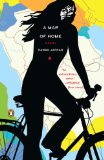Summary | Excerpt | Reading Guide | Reviews | Beyond the Book | Readalikes | Genres & Themes | Author Bio

Sixteen:
The Shit No One Bothered To Tell Us
1.
Our second year in America, approaching our third, and Baba still comes back from work on a bus. He hates the city. He likes the bus. It is efficient and cool and clean. The bus races through neighborhoods and picks up people in uniform. Baba smells his hands when the bus stops at our neighborhood. He burrows them in his coat. The weather is odd and Texan; it is hot; it is cold; and Baba loves it, because it is like him and can't decide which one it wants to be, or even if it wants to stay or leave.
Baba wants to build his own house. He has visited fourteen banks and their loan agents all flip through his paperwork and remind him of the soldiers at the Allenby bridge. They read it quickly and send him off. He has to build his credit before he can build a house, they say. He applies for more credit cards. He buys Mama an Olds, and pays for it in cash. The Olds reminds him of the one he had to leave in Amman. He couldn't drive it to Egypt, even though Egypt is for sure within driving distance from Amman.
He takes the bus to work. He works sixteen hours a day. He pays for dinners with his credit cards. He goes to the banks again. They remind him of the suspicious security agents at airports. He takes the bus home. He sees the uniforms on the bus. He comes home and screams at his daughter, who is turning into a slut, he's sure of it. He washes his hands; they are dirty from the bus. He goes to the bank. He leaves it without a house. He takes the bus to work.
2.
When on a rainy evening, we go out to check the mail – we made checking the mail a regular family outing in the second month since it's free- and find a large letter proclaiming us the winners of $10,000,000, we scream and jump up and down and bless America over and over again. Gamal does a cartwheel and I stand on my head. Baba shushes us and makes us get in the house,
"before people start begging us for a cut." We stand around the kitchen and plot out how we're going to spend it.
Baba wants to buy a house in every European city and furnish it with fine prostitutes. Mama wants to pay a hit man to kill Baba. Gamal wants an airplane and parachutes. And I want money to pay legal fees to emancipate myself from this family and live in a penthouse in New York. We stay up all night, giddy and giggly, and talk and plot until our mouths are dry deserts, drier than the fenceless and defenseless north of Kuwait. Then Mama breaks it to us slowly, what Ed McMahon says in the letter's fine print.
3.
Mama makes mad dough teaching piano classes. People all over town want cheap classes from the
"Mexican" lady. She says not Spanish, Egyptian. They say, "Oh," and they say it the way adults say Oh when a kid tell them he's Superbat.
"Oh." The rich kids pay a lot and the poor kids pay almost nothing. Mama likes to talk to their mamas and pretty soon everyone in the neighborhood is coming over, even the Jehovah's Witnesses. They come to the house every Sunday with Awake! and a kid who wants to play piano. Mama takes the magazine and uses it when she fries her potatoes. The excess oil runs over prophecies and Mama waits. She makes so much money she opens her own account and gets a credit card. She teaches one kid the Fantaisie-Impromptu and tells the mama about how this composer brought her husband and her together. The mama nods and asks,
"Back in Mexico?" Mama goes to the bank and waits for a loan officer. She applies for a mortgage. The woman asks to see her taxes. Mama hasn't filed any. Mama uses the money from the next 133 lessons to pay for her back taxes so she won't go to jail.
Excerpted from A Map of Home by Randa Jarrar. Copyright © 2008 by Randa Jarrar. Excerpted by permission of Other Press. All rights reserved. No part of this excerpt may be reproduced or reprinted without permission in writing from the publisher.
Your guide toexceptional books
BookBrowse seeks out and recommends the best in contemporary fiction and nonfiction—books that not only engage and entertain but also deepen our understanding of ourselves and the world around us.